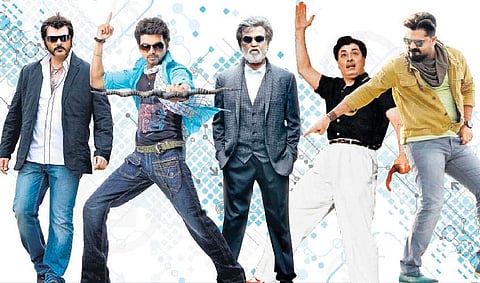

Celebrating films and consequently, the stars around which they are sometimes crafted, is part and parcel of your average Tamilian’s life. For many fans, a 3 am show to catch their favourite star’s film is the stuff of routine. The roaring inside the theatre begins when the censor certificate gets shown. It rises when the star’s name appears. It reaches a peak during the introduction scene. Directors, no strangers to these reactions, have, for a while now, been throwing in references to the star’s previous films, and sometimes, even to their off-screen persona in a bid to get the fans going. For Rajinikanth and Kamal Haasan, and later, for Ajith and Vijay, this idea has often worked wonders. So, what’s new?
It seems to be getting overdone in recent years, and sometimes, seems to be happening for actors whose recent run of films perhaps doesn’t quite warrant such worship (whether anyone does is a different topic altogether). Simbu’s latest, Vantha Rajavathaan Varuven, is among the most recent films to go overboard with all the pandering to its lead actor. The title itself is drawn from the actor’s dialogue from Mani Ratnam’s Chekka Chivantha Vaanam. The film has numerous references to the actor’s films including the popular Manmathan, the mediocre Vallavan, and even his unreleased film, Kettavan. The audience, it is fair to say, seemed puzzled by the torrent of references, especially at a time when the actor hasn’t exactly been able to set the screens on fire as consistently as his fans would have liked.
Film historian and actor Mohan Raman points out that the earliest self-referential dialogues in films were not about exaggerating the ability or persona of the star, but about communicating their political inclinations. “I think it was NS Krishnan who kickstarted this trend. He has even sung a song based on the DMK government back then, as he talks about a Thiruvalluvar Munnetra Kazhagam (Thi Mu Ka) to escape potential censor cuts. In the following years, stars like MGR used it to promote their political ideas that weren’t at all vital to the story,” he says. “Such films were more the actor talking to the audience than his character. The lyrics, ‘Edhir kaalam varum, en kadamai varum, indha kootathin aatathai mudippen,’ in Naan Aanaiyittal from Engal Veetu Pillai is among the most politically charged lyrics in the history of Tamil cinema.”
Sivaji Ganesan has also bit into this idea in films like Raman Ethanai Ramanadi. “There are multiple references to his personal life in this film which has him playing an actor,” says Mohan. “In one scene, he makes a political reference by looking at a particular character and saying, ‘Arasiyal theriyadhavana naan?’ It was an indirect response to the DMK government which had questioned his political knowledge. He also establishes in many places that he is a follower of Kamaraj.”
MGR is probably the first person to utilise this most efficiently to elevate his aura, he says. “Unlike the rest of the actors during that time, MGR went a step ahead and began talking about his generous nature in films. Even in the films where he played a person from a needy background, he was always portrayed as the Vallal. In the song, Pesuvadhu Kiliya, from Panathottam, there is a line that goes, ‘Paaduvadhu kaviyaa illai, paarivallal magana; Seranukku uravaa senthamizhar nilava!’ despite his character being a fisherman. ‘Seranukku uravaa’ is a reference to his birthplace, Kerala, ‘paari vallal’ refers to his supposed generosity, ‘senthamizhar’ emphasises his Tamil pride and ‘nilava’ refers to his name, Ramachandran.”
Later on, actors like Nagesh and Gemini Ganesan went on to reference themselves in their films. As Mohan points out, Server Sundaram was almost a biography of Nagesh. It was a story of an underdog with average appearance, aiming to become a star in Tamil cinema, which was basically the story of his life. Gemini Ganesan, on the other hand, has been referred to as Kadhal Mannan for his romantic nature in real life and the trend continued even till Avvai Shanmughi.”
Director Suresh Krissna, a major influence in the creation of Brand Rajinikanth, feels that such references to the star were necessary in his films, as the audience wanted to see him more than his character. And hence, say, the song, Vandhenda paal kaaran in Annamalai, which broke the fourth wall and spoke directly to the audience. “I’d not worked with Rajini before that, but was part of his speeches being readied. Whenever he spoke, or whenever someone made a reference to him, people went crazy. I wanted to utilise this connection in my films with him.”
The iconic Rajini theme music and the title animation was introduced by this director in Annamalai. The film’s many songs engaged directly with the audience. “I wanted to set a mood for the audience right from the beginning and make them understand that this was a ‘proper Rajini film’. That’s how we came up with the signature title card, inspired by the Bond theme.” He says it took a while for the team to set the metre for reference in the film, “Yaaruku, epo, epdi nu ellathukum oru kanakku venum la… We were particular not to overdo this too and spoil the experience of the audience. Witnessing the audience cheer for every single moment we pre-planned in the script, is something I’ll cherish forever.”
Today though, we seem to have arrived at a time when caution has been thrown to the winds. Plenty of films, almost as a duty, make references to Ajith and Vijay, and when done simply as a formulaic device, it gets exposed, as in Simbu’s latest film. Or perhaps it is that the audiences have become less naïve and gullible to such ideas which seek to elevate a star into something more? We won’t have to wait long to find out.